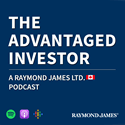Transferring the family business and estate planning

Senior Trust Advisor from Raymond James Trust (Canada), Damian McGrath, returns to the podcast to discuss transferring a family business to the next generation and some considerations for estate planning, including:
- What was in the last federal budget
- What about estate planning and the family business?
- What is an estate freeze?
- What about the scenario where I have one child in the business and another not – how do I estate plan around that?
- And what about an executor – who should that be?
- The importance of planning.
Follow the podcast on LinkedIn:The Advantaged Investor
Please subscribe, rate and review. Reach out at advantagedinvestorpod@raymondjames.ca
Transcript
Chris Cooksey: Hello and welcome to the Advantage Investor, a Raymond James Limited podcast. A podcast that provides perspective for Canadian investors who want to remain knowledgeable, informed, and focused on long-term success. We are recording this on April 27th, 2023. I'm Chris Cooksey from the Raymond James Corporate Communications and Marketing Department, and I'm speaking with Senior Trust Advisor, from Raymond James Trust, Damian McGrath.
Damian previously joined the podcast on episode 18 where we chatted about estate planning and episode 23, where we talked about trusts. Today we are talking about transferring a family business to the next generation, with some considerations for the estate planning process. Damian, welcome back to the podcast. I hope you're doing very well today.
Damian McGrath: Thank you very much, Chris. Yes, I am. Wow. Third time I didn't realize that.
Chris Cooksey: Well, I made a joke because we had another third time guest recently and it's hockey playoffs so that’s the hat trick. So it's the appropriate time for your third time being here. But a lot to get to, so we'll jump right in. Now Damian, you know this, I reached out to you because I saw a post on your LinkedIn, which is obviously a warning not to let the marketing guy read your LinkedIn because you end up in this situation, but it was about some proposed legislation in our most recent federal budget. So maybe you could just start off there by giving us an overview of what went on.
Damian McGrath: Great. And it's actually, I think, it's quite an interesting story. I mean, I'm an as an estate planner, so I'm not an accountant, but I always have to have an eye on what's going on with tax and transitions and things like that. And I found it quite an interesting story, and kind of giving a bit of an insight sometimes to how some of the legislation and tax legislation can evolve. We, we have to go back a little bit in time and look at some of the tax rules around the sale of a family business and. It used to be the case that if a family business was sold to a third party, so they, that was called arms length there was a different treatment than if that was a transfer to a family member.
So a non-arms length person and to a family resulted in a dividend payment rather than a capital payment. So it meant that the capital gains deductions couldn't quite be claimed. So actually, it was less advantageous from a tax point of view to transfer your business to your next generation family than a complete stranger.
So, you know, it was a bit of, a bit of a quirk then, as you can imagine, there was lots of complaints about this and issues delivered to the finance department, although not a lot was really done about it from their end. And then you had a conservative MP bring a private member's bill, essentially it's Bill C228 to kind of address that un unfairness.
And eventually that came into force in 2021. So now, those kind of like arms length and non-arms length treatment was kind of put back on par. But then, what became interesting is that the finance department basically discovered some loopholes in that legislation. And, as I forget, this is kind of a loophole in the private members bill legislation that was put forward to address the unfair loopholes in the original partners legislation.
Which, and those loopholes sort of potentially allowed a transfer to a child where it was in name only and then being wind up and then sold, and then kind of getting around some of the other sort of tax things. So not a genuine family transfer. So now we've got some proposed legislation now, that's probably going to effect from 2024 where it's going to address that.
So, you know, making sure that if there's a family transfer, it has to be a family transfer. So, you know, the outgoing parent needs to come step out and the child is stepping in. So actually making sure it's a genuine transfer. But I suppose, you know, one, it's interesting story, I think, but like the other moral of that story is, if you've got an operating business and you are starting to think about the next stage, whether that's a transition to family next generation or it's just a general sale.
You know, it's really good to start looking at this stuff, first of all, a few years in advance, right. And planning for that, but also really good to make sure you get some advice from your professionals and your tax accountants and all those sorts of things to start thinking about what that plan would be, because sometimes it moves around.
Chris Cooksey: Right. Always good to get that advice, especially when you're not being pressured to make the decision if something incapacitating or something like that happened. Now what about in terms of estate planning and the family business, what can you tell us there?
Damian McGrath: Yeah, I mean, you know, there's a difference between a, plan transition and an unplanned transition. You know, and I think you really ought to have that plan B set out in case you know, which usually starts with the will. You know, everyone knows that we should have a will. You know, but there is a difference between just having a will and having a sort of thought through estate plan, particularly when you've got a complexities of a family business.
You know, that estate plan's has to take into account like how assets are held how they would transition, what would happen if you passed away. You know, for example, if you've got a family business, you know, sometimes there might be some land involved in that. Now is that land part of the corporation or part of the business, and it's owned by that, or is owned by you personally, because that might make a difference as to how the structure it. So you've got to kind of analyze all of that sort of thing as well when you're kind of doing that planning.
Chris Cooksey: Right. That makes sense. Now, what about an estate freeze? I've heard about the estate freezes, but I honestly don't know what it means. So I thought we'd take this opportunity so I can learn a bit too.
Damian McGrath: Yeah, sure. Yeah. I mean, estate freezes are really quite common planning. And, and sometimes I find that, you know, you're doing your estate planning and then you sort of, you start working backwards from that and you're thinking, okay, well I think I know what my plan B ultimate structure might look like.
Maybe I should work back and see if there's things I should be doing in my lifetime planning as well. But, you know, and the state freezes is, let's say you've got a sort of an ongoing operating business, and you know, there is the intention to transition that onto the next generation, and you're expecting that business to grow the value of that business to grow.
The idea with an estate freeze is that you're kind of freezing the value of that business at that point in time. And then the owner is kind of taking that value out of that business in terms of sort of preferred set value shares, and then the equity shares, the growth shares in that business and then kind of put into the hands of the next generation.
So ultimately, you know, as that business grows over time, that growth and the equity growth is kind of in the hands of that next generation. So when you pass away, you're not really having a tax event at that point in time of the growth because it's basically being deferred to the next generation.
So, you know, there's a tax planning element to it as well. And there's also can be a, a, you know, a, a planning element in terms of you know, distribution of, of income. It's a little bit different now because they, they changed some rules in 2016 about what family members can take out of a corporation when they're not involved in it or take out of a business when they're not involved.
And that's an entirely different podcast on that, but it, it's almost old news that now it's kind of always been beaten. That one it's been done. But there can still be advantages to kind of looking at an estate freeze and having a, a side structure with a family trust involved in that as well.
So, you know, that's part, there's some tax planning that goes on there as well with it.
Chris Cooksey: Next question is around, and we've all seen new stories and of course you've probably experienced this, where a family owns a business and one person wants to be in the business but another person has forged their own way forward. In my mind, it can probably cause problems if it's, you know, the question of fairness or transfer or anything like that. So what are some comments around how do would you estate plan for that?
Damian McGrath: And it is quite a common issue, right? Because, you know, parents are striving for some kind of equalization and you know, you might have one, say you got one child that's involved in the family business and one that isn't.
And, sort of how do you make preparations for that as part of your plan B? You know, there's a nice little phrase that, you know, fair doesn't always mean equal. You know, it's okay to factor in that one child might have put sweat equity into that business, for example, and has sort of been part of the growth of that.
And, we're probably in an estate planning world, we're probably looking to try and avoid a scenario where non-involved family members of a business find themselves as owners of that business with the ones that are in it. Because that's where some problems can occur, right?
Because there's just different priorities going on there, right? And how do you kind of separate that? So, you know, often we're trying to look how divide those two things and that might involve looking at other assets, right and making distribution and saying, well, the business is going one way and the other assets are going another way, and there's an attempt to balance or, or maybe even looking like things like life insurance, either in the business or outside of the business to sort of generate a different size of a state right.
In, effect to be able to do that equalization. But you know, the interesting thing about it with, you know, particularly with a family business and estate planning is that everyone's different. You know, every structure is different. Every, every way we look at that is different, and a lot of the times involves really good conversations with the family.
And, you know, you can even get into the practicalities of who's opening the doors of the business tomorrow if something happens, how's that going to work? Right? Like, what are the obligations that you might have to, if it's a professional corporation or a medical corporation, what, what obligations do I have for my governing bodies and things like that. You can get quite, detailed in it, into it as well to really do that full planning.
Chris Cooksey: Now in terms of an executor, some people think it's an honour to be an executor. Some people have been an executor and realized how much work it is, and not necessarily an honour, although I'm sure you appreciate being trusted. But in these types of situations, who should the executor be?
Damian McGrath: Yeah, I think Chris, if you ask most people that have done the job as an executor, if they want to do it again, the answer would be no. I think that yeah, it it's a lot of work. It is complex and it's tough and there's a lot of things going on and I suppose, you know, the difficulty when you got that additional family business is, that you know, someone's going to need to be focusing on that business and running that business as well and trying to kind of do an estate administration at the same time, particularly if there are other potential beneficiaries involved and there's valuation issues of a business involved. And people might not, there might be conflicts going on there. You know, so a lot of clients I work with l kind of look at, well, you know what? I want to have an independent professional trustee. I want to have a trust company.
You know, I'm working with clients of Raymond James, who will say, you know what, we're just going to name Raymond James Trust Company as the executor. I know it's going to get done right. I know it's done fairly and I'm not going to put that burden or the responsibility on the kids.
So, you know, definitely something to think about when you've got those added complexities.
Chris Cooksey: And I assume too, that takes out the emotion or should take out the emotion involved in the situation, right.
Damian McGrath: Oh, definitely. I mean, you know the emotional toll of being an executor is overlooked.
You know, everyone talks about, oh, it's a hundred hours of work and you've got to do this and you've got to deal with it. But there is an emotional toll that comes with it and, you know, clouds judgment or changes judgment and changes people's perceptions as well. You know and I find just having someone independent you know, being, being a voice of reason involved in that scenario really helps.
Chris Cooksey: Excellent. Now in conclusion, what would you leave us with?
Damian McGrath: I think when we're talking about the family business and transition, I think it's a worry for a lot of clients. They kind of worry about what's going to happen and how it's going to work and is it going to be successful. And I think rather than sort of, you know, keep those worries internally, I would say well discuss those worries with your advisor or with your other professionals and start those conversations and even with the family and start making a plan.
You know, even if it's that plan B, that might also help you work out what your plan A is.
Chris Cooksey: Awesome. Well, let's leave it there, Damian , I hope you'll come back again, maybe a little quicker than -- that was a big episode jump between the last time you were on this. But it's always very informative and I really appreciate your time today.
Damian McGrath: Great. Thanks for having me on, Chris, anytime.
Chris Cooksey: Reach out to us at Advantaged Investor pod@raymondjames.ca. Subscribe to the [00:12:00] Advantage Investor on Apple, Spotify, or wherever you get your podcast. Please contact your advisor with any questions you have. On behalf of Raymond James and the Advantaged Investor, thank you for taking the time to listen today.
Until next time. Stay well.
This podcast is for informational purposes only. Statistics and factual data and other information are from sources. Raymond James Limited believes to be reliable, but their accuracy cannot be guaranteed. Information is furnished on the basis and understanding that Raymond James Limited. It's to be under no liability whatsoever.
In respect thereof, it is provided as a general source of information and should not be construed as an offer or solicitation for the sale or purchase of any product and should not be considered tax advice. Raymond James advisors are not tax advisors, and we recommend that clients seek independent advice from a professional advisor on tax related matters.
Securities related products and [00:13:00] services are offered through Raymond James Limited. Member of the Canadian Investor Protection Fund, insurance products and services are offered through Raymond James Financial Planning Limited, which is not a member of Canadian Investor Protection Fund.





